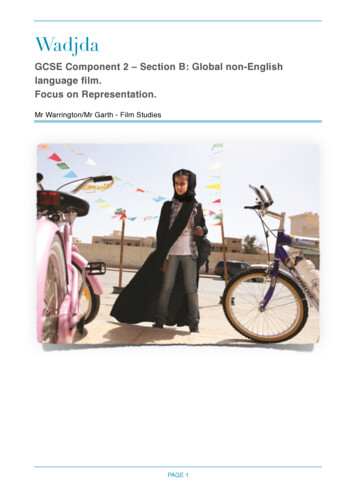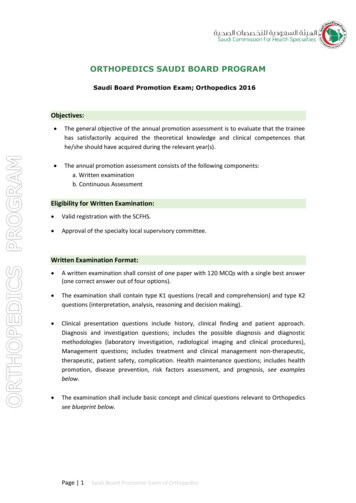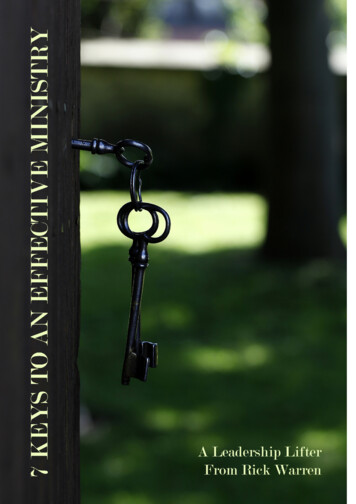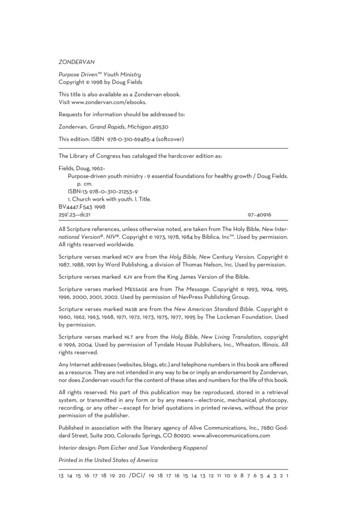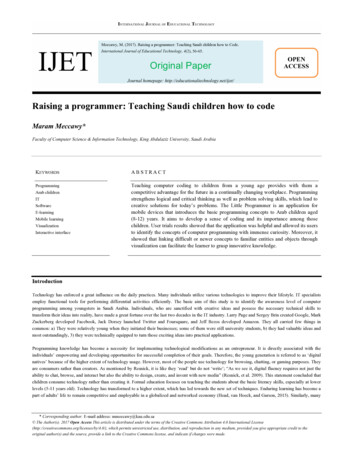
Transcription
Excerpts from Saudi Ministryof Education Textbooks for IslamicStudies: Arabic with English TranslationCenter for Religious Freedom of Freedom Housewith theInstitute for Gulf Affairs
TABLE OF CONTENTSFirst Grade: Monotheism and JurisprudenceEnglish Translation of pp. 29-30 of the Arabic text4First Grade: Monotheism and JurisprudenceArabic pp. 29-307Fourth Grade: Monotheism and JurisprudenceEnglish Translation of pp. 48-49 of the Arabic text10Fourth Grade: Monotheism and JurisprudenceArabic pp. 48-4913Fifth Grade, First Semester: Monotheism, Hadith, Jurisprudence,and Qur’anic RecitationEnglish Translation of pp. 14-15 of the Arabic text16Fifth Grade, First Semester: Monotheism, Hadith, Jurisprudence,and Qur’anic RecitationArabic pp. 14-1519Sixth Grade, First Semester: Monotheism, Hadith, Jurisprudence,and Qur’anic RecitationEnglish Translation of pp. 93-95 of the Arabic text22Sixth Grade, First Semester: Monotheism, Hadith, Jurisprudence,and Qur’anic RecitationArabic pp. 93-9526Sixth Grade: History of the Kingdom of Saudi ArabiaEnglish Translation of pp. 73-77 of the Arabic text30Sixth Grade: History of the Kingdom of Saudi ArabiaArabic pp. 73-7736Eighth Grade: MonotheismEnglish Translation of pp. 42-46 of the Arabic text42Eighth Grade: MonotheismArabic pp. 42-4648Ninth Grade: HadithEnglish Translation of pp. 148-150 of the Arabic text542
Ninth Grade: HadithArabic pp. 148-14958Tenth Grade: JurisprudenceEnglish Translation of p. 47 of the Arabic text61Tenth Grade: JurisprudenceArabic p. 4763Tenth Grade: MonotheismEnglish Translation of pp. 66-67 of the Arabic text65Tenth Grade: MonotheismArabic pp. 66-6768Tenth Grade: Hadith and Islamic CultureEnglish Translation of pp. 101-106 of the Arabic text71Tenth Grade: Hadith and Islamic CultureArabic pp. 101-10678Eleventh Grade: Hadith and Islamic CultureEnglish Translation of p. 66, pp. 115-120 of the Arabic text85Eleventh Grade: Hadith and Islamic CultureArabic p. 66, pp. 115-12093Twelfth Grade: Hadith and Islamic CultureEnglish Translation of pp. 56-59 of the Arabic text101Twelfth Grade: Hadith and Islamic CultureArabic, pp. 56-591063
Kingdom of Saudi ArabiaMinistry of EducationEducation DevelopmentMonotheism and JurisprudenceFirst Grade1426-14272005-2006Distributed FreeNot for Sale4
[PAGE 29]My Religion is IslamThe foundation of Islam is the profession of faith that there is no deity other than Godand Muhammad is God's Prophet.Every religion other than Islam is false.God said, "If anyone desires a religion other than Islam (submission to Allah), never willit be accepted of him; and in the Hereafter He will be in the ranks of those who have lost(All spiritual good)." (Qur'an 3:85)Thus, I am a Muslim and I will not accept any religion but Islam.5
[PAGE 30]For DiscussionWhat is the foundation of Islam?Fill in the blanks with the appropriate words (Islam, hellfire):Every religion other than is false. Whoever dies outside of Islam enters .God accepts nothing but Islam as a religion. Cite the proof.Put a check mark next to the occasions when a Muslim recites the profession of faith.During the call to prayerWhen eatingAfter completing the ablutionAfter sneezingFor the teacher:Note the hadith of Mu'adh. When the Prophet sent him to the people of Yemen, heordered him to call upon them first and foremost to profess that there is no deity but God.Cited in Al-Bukhari (number 7372) and Muslim (number 19).Explain the great significance of the two professions of faith, and that they are the firstgates through which the servant enters Islam.Give examples of false religions, like Judaism, Christianity, paganism, etc.Explain that when someone dies outside of Islam, hellfire is his fate.Lesson goals:1. For the student to point out the foundation of Islam.2. For the student to treasure the religion of Islam.3. For the student to understand that any religion other than Islam is false.6
7
8
9
Kingdom of Saudi ArabiaMinistry of EducationEducation DevelopmentMonotheism and JurisprudenceFourth Grade1425-1426Distributed FreeNot for Sale10
[PAGE 48]Lesson TwoTrue BeliefThe meaning of belief in God:To believe in God means that you believe God is the only deity to be worshipped,without any beside Him. You sincerely engage in all forms of worship of God and denythem to any object of worship other than Him. You love in God and you hate in God.This is the creed1 of Abraham, and whoever rejects it debases his soul with folly. This isthe example God gave: "There is for you an excellent example (to follow) in Abrahamand those with him, when they said to their people: "We are clear of you and of whateverye worship besides Allah: we have rejected you, and there has arisen, between us andyou, enmity and hatred for ever, unless ye believe in Allah and Him alone." (Qur'an60:4)2Lesson Instructions:Belief is not just a word that a person pronounces with the tongue. It consists of speech,conviction, and action.True belief means:That you believe that God is one, that He has no peer, and that He alone isdeserving of worship.That you worship God sincerely.That you love the believers and aid them.12Creed means faith. The creed of Abraham is the faith of monotheism.Surah Al-Mumtahinah, verse 4.11
[PAGE 49]That you hate the polytheists and infidels but do not treat them unjustly.Whoever abandons this faith and rejects the creed of Abraham debases his soul with follyand subjects himself to corruption and ruin. God said: "And who turns away from thereligion of Abraham but such as debase their souls with folly?" (Qur'an 2:130)3QuestionsQuestion 1: Abraham is the father of the prophets. God sent him to His people to call onthem to worship God alone. They had been worshipping idols other than God. Abrahamcalled on them to worship God alone. But they were stubborn and arrogant, and theyinsisted on worshipping idols. When they came out to celebrate their holiday, Abrahamsmashed their idols. When they learned of this, they started a large fire and threw himinto it. Do you know what happened to Abraham? The fire did not burn him. God madethe fire cold and safe for him.Question 1 [sic]: The story of Abraham demonstrates several aspects of faith. Explainthem on the basis of the text.Question 2: What makes belief true?Question 3: What is someone who has abandoned the creed of Abraham called?Question 4: What harm does someone who abandons the creed of Abraham do tohimself?Question 5: Is belief true in the following instances:a. A man prays but hates those who are virtuous.b. A man professes that there is no deity other than God but loves the infidels.c. A man worships God alone and loves the believers.3Surah al-Baqarah, verse 13012
13
14
15
Kingdom of Saudi ArabiaMinistry of EducationEducation DevelopmentMonotheism, Hadith, Jurisprudence, and Qur'anic RecitationFifth GradeFirst Semester1425-1426Distributed FreeNot for Sale16
[PAGE 14]Lesson FourIt is not permitted to be a loyal friend to those who oppose God and His ProphetThird: Whoever obeys the Prophet and accepts the oneness of God cannot be loyal tothose who oppose God and His Prophet, even if they are his closest relatives.The proof is in the Qur'an: "Thou wilt not find any people who believe in Allah and theLast Day, loving those who resist Allah and His Messenger, even though they were theirfathers or their sons, or their brothers, or their kindred. For such He has written Faith intheir hearts, and strengthened them with a spirit from Himself. And He will admit them toGardens beneath which Rivers flow, to dwell therein (for ever). Allah will be wellpleased with them, and they with Him. They are the Party of Allah. Truly it is the Partyof Allah that will achieve Felicity." (Qur'an 58:22)4Lesson Instructions:Loyal friendship means love and aid to God, His Prophet, and the believers in words anddeeds. It is one of the noblest parts of religion.The loyalty of the believer who accepts the oneness of God belongs always to God, HisProphet, and the believers.It is forbidden for a Muslim to be a loyal friend to someone who does not believe in Godand His Prophet, or someone who fights the religion of Islam.A Muslim, even if he lives far away, is your brother in religion. Someone who opposesGod, even if he is your brother by family tie,4Verse 22 from Surah al-Mujadalah.17
[PAGE15]is your enemy in religion.The companions [of the Prophet] demonstrated the most astonishing examples of trueloyalty to God and His religion when they fought against their relatives who battled theProphet. God praised them for this5.QuestionsQuestion 1: Recalling the proof, is it permissible to love the Jews and the Christians?Question 2: What is the punishment for the most hateful enemies of God?Question 3: Give the meaning of loyalty.Question 4: Give the three issues that every Muslim must learn.5See Loyalty and Enmity in Islam, Shaykh Muhammad Bin Sa'id al-Qahtani.18
19
20
21
Kingdom of Saudi ArabiaMinistry of EducationEducation DevelopmentMonotheism, Hadith, Jurisprudence, and Qur'anic RecitationSixth GradeFirst Semester1425-1426Distributed FreeNot for Sale22
[PAGE 93]Lesson SevenFuneralsRules on washing, shrouding, praying for, and burying the dead.Washing, shrouding, praying for, and burying the dead are a collective duty (if enoughpeople perform it, the rest have not sinned).How to pray for the dead:There are four recitations of "God is great" in the prayer for the dead. They take thefollowing forms:1. The words "God is great" are recited, then the words "God forbid," then the words"In the name of God" (without reciting the opening supplication), then the Fatihah[first chapter of the Qur'an].2. The words "God is great" are recited a second time, and prayers are offered forthe Prophet.3. The words "God is great" are recited a third time, and prayers are said for thedeceased person, his soul, and Muslims.4. The words "God is great" are recited followed by a short silence, and then a singlegreeting is offered to the right side.How to pray for the Prophet: “O God, pray for Muhammad and for the family ofMuhammad as You prayed for Abraham and for the family of Abraham, for You arepraiseworthy and glorious. Bless Muhammad and the family of Muhammad as youblessed Abraham and the family of Abraham, for You are praiseworthy and glorious.”23
[PAGE 94]In one of the prayers for the deceased, you say the following: “O God, forgive him andhave mercy on him. Heal him and absolve him. Give him bountiful provisions. Widen theentrance for him. Wash him with water, snow, and hail. Cleanse him from transgressionsas white garments are cleansed of dirt. Replace his dwelling with a better dwelling, hiskin with a better kin, and his spouse with a better spouse. Bring him into paradise. Protecthim from the corruption of the grave. And save him from the torment of hell.”Funeral traditions:1. To walk with the funeral procession until burial in the grave.2. To bring the funeral procession quickly to the grave.3. To offer condolences to the family of the deceased with a phrase, for example:"May God make great your reward, ensure that you receive solace, and forgiveyour deceased."4. To visit graves (for men). When visiting the cemetery, one says: "Peace be uponyou, realm of the believers. God willing, we will join you. God have mercy onthose of you who arrived early and those who arrived late."5. The bereaved says, "We belong to God and to Him we return."Funeral prohibitions:1. It is forbidden to be angry upon bereavement, cry out loudly, tear one's clothes, orbeat one's cheeks or other [parts of the body].2. It is forbidden to sit on graves and walk on them.3. It is forbidden to pray at graves, with the exception of the funeral prayer.4. It is not good to raise one's voice during the funeral, even in mentioning the nameof God or reading the Qur'an.5. It is forbidden to build mosques on graves.24
[PAGE 95]QuestionsQuestion 1: Which funeral prayers does one say after the first recitation of "God isgreat"? The second, the third, and the fourth?Question 2: Explain the rules for the following:a.b.c.d.e.Washing the deceasedCondolencesGraveside prayersRaising one's voice during the funeralShrouding the deceasedQuestion 3: What is one permitted to say in the following cases:a. When visiting the cemeteryb. When offering condolences to the family of the deceasedc. Upon bereavementQuestion 4: Give some examples of anger at a time of bereavement25
26
27
28
29
Kingdom of Saudi ArabiaMinistry of EducationEducation DevelopmentHistory of the Kingdom of Saudi ArabiaSixth Grade1425-1426Distributed FreeNot for Sale30
[PAGE 73]Chapter FiveThe Kingdom's Efforts on the International ArenaThe Issue of PalestineRegional and International Organizations and Bodies31
[PAGE 74]Part OneThe Kingdom's Efforts on the International ArenaKing Abdulaziz made great efforts to unite the country, ensure its security, and lay thefoundation for progress. Thanks to the rulers who came after him, development andprosperity were achieved in various areas. Yet the efforts of the Kingdom's leaders, fromits foundation up through the present, have not been limited to internal reforms. Theyhave also made great efforts in the international arena. First and foremost among these,and an object of the Kingdom's ongoing engagement, are the issue of Palestine andinternational and regional organizations and bodies6.The Issue of PalestinePalestine is a part of the Islamic world. It is the location of the Al-Aqsa Mosque and thefirst of the two Qiblas. See Surah 30.Ever since the Prophet's ascent to heaven, Palestine has been dear to the Arabs inparticular and to Muslims in general. When Palestine fell under British rule, it gave theJews a chance to achieve their aims. Britain made it easy for them to flee there and laidthe groundwork for them to organize and train in the use of arms. The Palestinians triedto resist the JewsIllustration number 30: the Al-Aqsa Mosque6Regional organizations are organizations that limit membership to countries in a specific region.32
[PAGE 75]and their allies. Their jihad almost succeeded, but the American government was biasedin favor of the Jews and pressured Britain to allow more than 100,000 Jews to enterPalestine in a single year. The crimes Zionist gangs committed against Palestinianresidents caused many of them to flee to neighboring Arab countries.The Jews Announce the Establishment of Their StateBritain withdrew from Palestine in 1367 (1948), opening the door to the establishment ofa Jewish state on Arab land in Palestine. And this is what the Jews did. They announcedthe establishment of a state they called the "state of Israel." Performing their duty, Arabcountries decided on military intervention to help the Palestinians. But circumstances inthe Arab world and elsewhere did not allow the Arabs to achieve victory over the Jews.Most parts of Palestine came under Zionist rule. The Zionists then gained control over therest of Palestine, including Jerusalem, as a result of the 1387 war. See map Figure 31.The Kingdom's Efforts to Aid the Palestinian Cause1 - King Abdulaziz tried to convince the leaders of the great powers to saveFigure 31: the division of Palestine in 1967AdditionalBalfour, the British foreign minister, made a promise on November 2, 1917 to givePalestine to the Jews as a national homeland if Britain emerged victorious from its waragainst the Ottoman state. Britain did emerge victorious, and the Jews got what theywanted. After this, the gates were opened for the Jews to emigrate to Palestine.33
[PAGE 76]the Palestinians from injustice.2 - A division of the Saudi Army was deployed to join the Arab armies and help thePalestinians in the 1367 war against the Jews.3 - The Kingdom has provided ongoing material and moral support to the Palestiniansand their just cause. Recall some examples of material and moral support that theKingdom gives the Palestinians.The Palestinians today suffer various forms of oppression under Jewish rule. Those wholive outside Palestine in camps also suffer various forms of injustice and repression. ThePalestinians confront grave difficulties.But God has guaranteed that He will help whoever helps Him. Just as Muslims weresuccessful in the past when they came together in a sincere endeavor to evict theChristian crusaders from Palestine, so will Arabs and Muslims emerge victorious, Godwilling, against the Jews and their allies if they stand together and fight a true jihad forGod, for this is within God's power.God said: "To those against whom war is made, permission is given (to fight), becausethey are wronged;- and verily, Allah is most powerful for their aid." (Qur'an 22:39)Who is the Muslim leader who was victorious over the crusaders and liberated Bayt alMaqdas [Jerusalem]?What is the name of the battle in which he triumphed?Give another verse from the Qur'an that affirms God's aid to the believers.Cite a noble hadith that explains the qualities of the Jews.34
[PAGE 77]QuestionsQuestion 1: Put a check mark after a true statement and an X after a false statement in thefollowing exercise:a.b.c.d.The American government was biased in favor of the Jews.Britain made it easy for the Jews to emigrate to Palestine.European nations intervened militarily to help the Palestinians.The Kingdom gave the Palestinians material and moral support.Question 2: What is the significance of Palestine to the Arabs in particular and toMuslims in general?Question 3: The Kingdom has made noble efforts to aid the Palestinians. List some ofthem:Question 4: Give the reason for the following:a.b.c.d.The Kingdom's participation in the 1367 war against the Jews.Britain's withdrawal from Palestine in 1367 (1948).The emigration of many Palestinian residents to neighboring Arab countries.The Arabs' inability to achieve victory over the Jews.Question 5: What was the result of the 1387 war?ActivityWith the help of your classmates, write a phrase on a poster that shows your support forthe Palestinian people and hang it in school.35
36
37
38
39
40
41
Kingdom of Saudi ArabiaMinistry of EducationEducation DevelopmentMonotheismEighth Grade1426-14272005-2006Distributed FreeNot for Sale42
[PAGE 42]Lesson FourteenChapter: how some members of this [Muslim] nation worship idolsLesson Goals1.2.3.The student notes some of the Jews' condemnable qualitiesThe student is warned against imitating the Jews and Christians' excessive veneration of righteousmen.The student gives examples of polytheism among members of this nation.IntroductionThe Prophet made it known that polytheism occurs in this nation just as it occurred in earlier nations, and itoccurred as he said.1.2.3.God said: "Hast thou not turned Thy vision to those who were given a portion of the Book? theybelieve in sorcery and Evil, and say to the Unbelievers that they are better guided in the (right)way Than the believers!" (Qur'an 4:51)God said: "Say: 'Shall I point out to you something much worse than this, (as judged) by thetreatment it received from Allah? those who incurred the curse of Allah and His wrath, those ofwhom some He transformed into apes and swine, those who worshipped evil.'" (Qur'an 5:60)And said: ".those who prevailed over their affair said, 'Let us surely build a place of worship overthem.'" (Qur'an 18:21)Word DefinitionsWordAwthan [idols, plural]Nasib [share, lot, fate]Al-JibtAl-TaghutMathwabah [Reward]Wa-ja'ala minhum al-qiradah wa-l-khanazir [And hemade apes and swine out of them]DefinitionIdol [singular]: Anything worshipped other thanGod, such as graves, trees, etc. The word "wathan"is more general than the word "sanam" [idol].Share, lotThe word refers to an idol, sorcerer, or soothsayer.Here it means the devil.RewardThey are the people of the Sabbath, whose youngpeople God turned into apes, and whose old peopleGod turned into swine to punish them7Lesson ElementsFirst: Circumstances surrounding the revelation of the first Qur'anic verse [cited above]:The verse was revealed about Ka'b Bin al-Ashraf and Huyay Bin al-Akhtab, two Jewish scholars. Theycame to the people of Mecca, who asked them, "You are people of the book and men of learning, so tell usabout ourselves and about Muhammad." They said to them [the people of Mecca], "You are better andbetter guided." They said this out of insult and envy even though they knew that Muhammad was right.And then God revealed the verse "Hast thou not turned Thy vision to those who were given a portion of theBook?"7As cited in Ibn Abbas: The apes are Jews, the people of the Sabbath; while the swine are Christians, theinfidels of the communion of Jesus.43
[PAGE 43]Second: The first verse notes some of the Jews' condemnable qualities:God told His Prophet, Muhammad, about the Jews, who learned from parts of God's book (the Torah andthe Gospels) that God alone is worthy of worship. Despite this, they espouse falsehood through idolworship, soothsaying, and sorcery. In doing so, they obey the devil. They prefer the people of falsehood tothe people of the truth out of envy and hostility. This earns them condemnation and is a warning to us notto do as they did.Third: Punishment of the Jews, who gave up their religionThe Jews lost their religion and attacked the religion of Islam, which consists of accepting the oneness ofGod and the worship of Him alone. God told His Prophet Muhammad: Say to those who cast aspersions onyour religion: has anyone told who will receive the harshest punishment from God on the Day ofResurrection? They are the Jews, whom God has cursed and with whom He is so angry that He will neveragain be satisfied [with them]*. Some of the people of the Sabbath were punished by being turned into apesand swine. Some of them were made to worship the devil, and not God, through consecration, sacrifice,prayer, appeals for help, and other types of worship. Some of the Jews worship the devil. Likewise, somemembers of this nation worship the devil, and not God.Fourth: Building mosques on graves is an expression of polytheismThe people of the cave were righteous young men who saved their faith from their polytheists amongwhom they lived*. When people discovered the people of the cave and saw the great miracle of theirresurrection after 309 years, they had various ideas about what to do. Some influential men and oratorssaid, "Let us build a mosque for them so that they are well-known and people can come to them and obtainblessings from them." This contains obvious elements of forbidden polytheism. For this reason, God chidedthem and warned this nation not to follow the path of the Christians. Some Muslim countries have seen thegraves of righteous men venerated through the construction of mosques. Graves have even beenworshipped. In doing this, they [Muslims] imitated the Christians.ActivityA group of students should prepare the story of the cave-dwellers and present it to their classmates, linkingit to the lesson.Evaluation:Question 1: God said: "Hast thou not turned Thy vision to those who were given a portion of the Book?they believe in sorcery and Evil, and say to the Unbelievers that they are better guided in the (right) wayThan the believers!"a.b.What were the circumstances in which this verse was revealed?Note some condemnable characteristics of the Jews in the verse.Question 2: God said: "Say: 'Shall I point out to you something much worse than this, (as judged) by thetreatment it received from Allah? those who incurred the curse of Allah and His wrath, those of whomsome He transformed into apes and swine, those who worshipped evil.'"God punished the Jews in several ways for their unbelief and error. Explain the ways.**Translator's note: this is a paraphrase of Qur'an 5:60.Translator's note: the story of the "people of the cave" is told in Qur'an 18.44
[PAGE 44]Lesson FourteenEvaluationQuestion 3 - The excessive veneration of righteous men by building mosques on their graves could lead totheir worship.Recall the story in the Surah of the Cave [Qur'an 18] and explain this.Question 4 - Complete the following expressions with the appropriate words:a.b."Al-wathan" [idol] is."Al-taghut" [devil] means.45
[PAGE 45]Chapter, continued: how some members of this nation worship idolsLesson Goals1.2.3.The student explains the danger of imitating the Jews and ChristiansThe student lists the consequences of imitating the Jews and Christians.The student gives examples of imitating the infidels.4. Abu Sa'id recounted that the Prophet said, "You imitate the ways of those who came before you as onefeather of an arrow resembles another. If they were to enter the burrow of a lizard, you would also enter it."They said, "O Prophet of God, [do you mean] the Jews and the Christians?" He said: "Who else?"8Word MeaningsWordSunan [ways, customs]Hadhwa al-qudhha bi-l-qudhhaDefinitionWaysAs one feather of an arrow is like anotherLesson ElementsFirst: How the ignorant people of this nation imitate the people of the book:The Prophet swore that this nation follows the ways of the Jews and Christians. He said, "For you imitatethe ways of those who came before" so that you are like them and the same as they are, just like the feathersof an arrow when it is fired. There is nothing that they have done that you would not do. Even if they wereto enter the burrow of a lizard, you would enter it as well, so closely do you follow the path of those whocame before you. The Prophet used the example of a lizard's burrow because it is narrow and winding. Hedid this to underscore that the imitation was total.This hadith showed that ignorant people from this nation will do anything the people of the book do thatGod has condemned. The meaning of this passage is that it is forbidden to follow them. What the Prophetspoke of has taken place, and this is a sign of the Prophet's foretelling and miracles.The Prophet warned against imitating the polytheists. He said, "Whoever imitates a people is one of them."9This is because the imitation of their rituals and customs of worship corrupts the religion of Muslims andleads them to love, venerate, and admire the enemies of the faith.We must be careful to avoid imitating non-Muslims in ways that contradict the law of God. We must alsofollow the straight path, praying to God to hold fast to this religion until the day we go to meet Him.89Al-Bukhari (number 3456) and Muslim (number 2669).Abu Daud (number 4031).46
[PAGE 46]Lesson FifteenActivityThe student writes a composition on the danger of imitating the infidels, giving some examples of imitationamong the students. He then presents it to his classmates.EvaluationQuestion 1: What is the meaning of the Prophet's statement: "You imitate the ways of those who camebefore you as one feather of an arrow resembles another. If they were to enter the burrow of a lizard, youwould also enter it."Question 2: The Prophet said, "Whoever imitates a people is one of them."Explain the consequences of imitating the polytheists.47
48
49
50
51
52
53
Kingdom of Saudi ArabiaMinistry of EducationEducation DepartmentHadithNinth Grade1426-14272005-2006Distributed FreeNot for Sale54
[PAGE 148]HadithForty-SixWhen God sent his Prophet Muhammad, He abrogated with his law all [other] laws andHe commanded all people, including the people of the book, to believe him and to followhim. The people of the book should have been the first to believe him because they findhim in their scriptures. Their prophets had informed them of Muhammad's mission. Butmost of them denied and rejected him.The clash between this [Muslim] nation and the Jews and Christians has endured, and itwill continue as long as God wills. In this hadith, Muhammad gives us an example of thebattle between the Muslims and the Jews.Narrated by Abu Hurayrah: The Prophet said, "The hour [of judgment] will not comeuntil the Muslims fight the Jews and kill them. [It will not come] until the Jew hidesbehind rocks and trees. [It will not come] until the rocks or the trees say, 'O Muslim! Oservant of God! There is a Jew behind me. Come and kill him. Except for the gharqad,which is a tree of the Jews.’"Al-Bukhari: 103/6, number 2926. Volume: Jihad; Chapter: Fighting the Jews. But it doesnot contain "except for the gharqad." [The hadith is also cited in] Muslim, including saidexpression: 2239/4, number 2922. Volume: Pertaining to the turmoil and portents of thelast hour; chapter: The hour [of judgment] will not come until a man passes by a man'sgrave and wishes to take the place of the deceased.Choose an appropriate title for the hadith and write it in the blank at the top of the page.Word MeaningsWordThe hour [of judgment] will not come*GharqadDefinitionA large tree with thornsInstructions on the content of the hadith:1. It is part of God's wisdom that the struggle between the Muslim and the Jewsshould continue until the hour [of judgment].2. The good news for Muslims is that God will help them against the Jews in theend, which is one of the signs of the hour [of judgment].*The student should clarify the meaning on his own and write it in the space left blank.55
[PAGE 149]3. Muslims will triumph because they are right. He who is right is always victorious,even if most people are against him.4. God will help Muslims if their intentions are sincere, if they are united, if theyadhere to the law of their Lord, if they obey His judgments, and if they are patientand enduring.5. Material strength alone is not enough for victory. One must also rely on God anddepend on Him.6. Whoever is with God, God is always with him, even if he should encountervarious trials and afflictions. What matters is the final outcome.7. The Jews and Christians are enemies of the believers, and they cannot approve ofMuslims. As God said, "Never will the Jews or the Christians be satisfied withthee unless thou follow their form
English Translation of pp. 56-59 of the Arabic text Twelfth Grade: Hadith and Islamic Culture 106 Arabic, pp. 56-59 3. Kingdom of Saudi Arabia Ministry of Education Education Development Monotheism and Jurisprudence First Grade 1426-1427 2005-2006 Distributed Free Not for Sale 4 [PAGE 29
